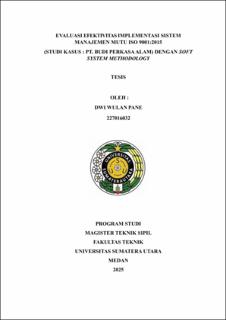| dc.description.abstract | The implementation of the ISO 9001:2015 Quality Management System (QMS) is
an important strategy for companies in maintaining competitiveness and meeting
increasingly complex customer demands. PT. Budi Perkasa Alam has adopted this
standard, but its implementation still faces several challenges, such as gaps
between theory and practice, suboptimal use of documentation, and the need to
improve employee understanding. This study aims to evaluate the extent to which
the implementation of the ISO 9001:2015 QMS has been applied in the company.
The research method uses the Soft Systems Methodology (SSM) approach, which
emphasises understanding the system within the social and technical context of the
organisation. Data was collected through questionnaires and interviews, then
analysed using Rich Picture and the CATWOE (Customer, Actor, Transformation,
World View, Owner, Environmental Constraints) concept to map the issues
comprehensively. The research results indicate that the level of implementation of
ISO 9001:2015 SMM is generally in the ‘Good’ category, with an average
achievement of 81.38%. However, some clauses still show suboptimal
implementation, particularly in the aspect of resource availability, which scored
78.46%. These findings indicate that although the system is functioning well, there
is still room for continuous improvement in efforts to enhance the overall
effectiveness of the quality management system. It is hoped that the results of this
study can serve as a basis for companies to take strategic steps to strengthen quality
performance in a sustainable manner. | en_US |


